#signs of autism
Text
Easily Overlooked Autistic Traits
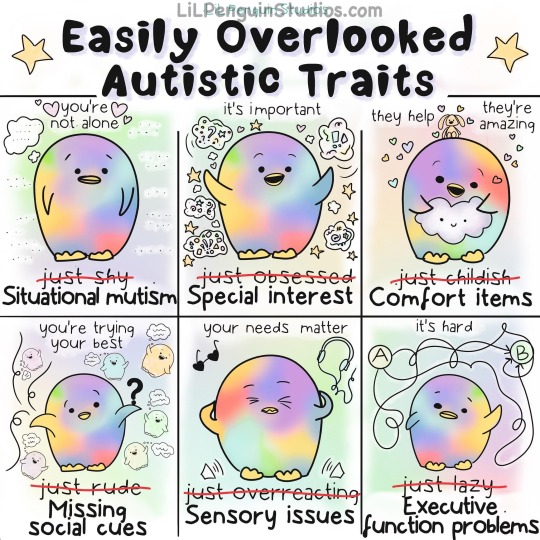
Situational Mutism
Special interests
Comfort items
Missing social cues
Sensory issues
Executive function problems
Lil Penguin Studios/Autism Happy Place
#autism#actually autistic#easily overlooked traits#signs of autism#executive function problems#comfort items#missing social cues#special interest#situational mutism#sensory issues#neurodivergence#neurodiversity#actually neurodivergent#feel free to share/reblog#lil penguin studios/autism happy place (facebook)
940 notes
·
View notes
Text
“autistic people may prefer to keep lists of information or things that interest them” huh, weird... anyways, i’m gonna go back to working on my elaborately organized list of every tv show i’ve ever watched
#an alternative version of my previous post lmao#anyone wana see the list? its pretty bitchin ngl#i highly recommend the notion website/app#actually autistic#actually autism#just autism things#just autistic things#signs of autism#neurodivergent#neurodiversity#just neurodivergent things#autistic memes#autism memes#neurodivergent memes#its the autism
923 notes
·
View notes
Text
Do you ever look back at your life and think “Huh, I probably have undiagnosed autism”
Bc one time in middle school (8th grade) I was reading this American girl book on how to make friends cause I didn’t have any and one of the tips was to talk about stuff in common with the example sentence being “what did you think of the jello project we did last week?”
my brain processed all that as “say this exact sentence from the American Girl book and you will make friends”
so the next day I deadass went up to a random person who wasn’t even in any of my classes outside the school portables and said, word for word, “what did you think of the jello project we did last week”
25 notes
·
View notes
Text
I’ve noticed something very weird and specific about me (and my sib), and I’m beginning to wonder if it’s some kind of vocal stim.
So, sometimes I (slightly randomly) do this thing where I’ll just start speaking in some random accent, mainly a British or Australian accent. I’m not saying they’re good accents or even close to accurate. Sometimes they aren’t accents I’ve ever even heard in my entire life. But for some reason, doing these accents gives me a similar sensation to any other types of stimming. It calms me down a lot to speak these kinds of ways. Sometimes it’s not even a British accent, it’s something else.
It’s 100% not involuntary (I’ll sometimes start speaking in an ‘accent’ without realizing it, but I can stop pretty easily), but it’s nonetheless slightly random.
I don’t do these to make fun of people (typically the accents are ones that I find pretty or nice) nor do I think that I’m good at accents (I almost always do this in private out of embarrassment), but I still do it.
It’s hard to explain, it’s just that....you know how a lot of vocal stims feel sometimes, particularly self soothing ones and ones that make you feel good? That’s how doing these random accents makes me feel. They feel similar to any other vocal stim.
So I’m starting to wonder if it might actually be some kind of weird vocal stim. Anyone have any suggestion/similar experiences?
#autism#autistic#autistic spectrum#actually autistic#autistic community#Stimming#stim#vocal stimming#advice#looking for answers#autistic pride#signs of autism#autistic stimming#autistic person#vocal stims#stims#stimming positivity#accents#verbal stimming
22 notes
·
View notes
Text
Signs of Autism in Toddlers
The signs of autism can vary from person to person. Some children display early signs of the disorder, while others don't show symptoms until they're older. But no matter what the age of your child, it's never too late to get a diagnosis and start getting the support they need to live their best life.
Early Signs of Autism in Babies
One of the earliest red flags of autism is an infant who doesn't interact with other babies as well as other babies their age. The baby may not smile back and forth or respond to names, and they may avoid eye contact with their parents.
This behavior isn't normal for an infant and should be reported to their healthcare provider during well-baby visits. Caregivers should also ask for tests to determine if a baby has an autism spectrum disorder.
Some early signs of autism include obsessive-compulsive behaviors such as lining up things in a particular order or preoccupation with a specific topic of interest. This can include memorizing facts about maps, trains, or sports statistics.
Performing repetitive behaviors such as flapping hands, rocking, or twirling can also be an early sign of autism in toddlers. Repeated movements like this can be soothing to the child, but they can also distract them from concentrating on other things.
Self-stimulatory Behaviors (or "stimming")
Some people with autism have very strong reactions to certain sensory stimuli, such as touch, taste, or smell. They may react quickly and intensely to these stimuli or they may respond very slowly and gently.
These responses can be more pronounced in toddlers with autism than in typically developing toddlers. For example, an autistic child with an obsession with light switches might flip them repeatedly or they might play with toys such as keys and rubber bands in unusual ways.
Other signs of autism in toddlers include difficulties interacting with other children and difficulty learning new social situations. These problems often improve with age, but some children will continue to have these issues throughout their lives.
The signs of autism in toddlers and young children can be subtle, but they can make it hard for family members to recognize the differences. For example, a young child with autism might prefer routines and be easily upset by changes in their daily schedules.
High-Functioning ASD
Many individuals with autism are diagnosed as having high-functioning autism, also known as Asperger's syndrome. These individuals can often be very bright and excel in school. They might have impressive vocabularies and a strong interest in particular topics or activities, such as art, music, or science.
They might also enjoy talking in an eccentric way, such as using a very wide range of vocabulary or constantly interrupting conversations with other people. This could be seen as a symptom of adult autism diagnosis, but it could also simply be an eccentricity.
A person with high-functioning autism might have a variety of different skills and be able to learn at a faster rate than other people their age. These skills might be a great benefit to the person with autism, but they can also be a barrier to social interaction.
#autism#autism symptoms#autism spectrum#signs of autism#symptoms of autism#autism in adults#adult autism#adult autism symptoms#is autism hereditary#autism therapy#autism levels#signs of autism in women#adult autism diagnosis#autism traits
16 notes
·
View notes
Text
Autism Speaks ~ Are You Listening? Neurodiverse Awareness
Autism Speaks ~ Are You Listening? Neurodiverse Awareness
The following is written by my beautiful daughter, Kai, who is diagnosed as Autistic, as is one of her children. She is an advocate for the Autistic/Neurodivergent community. Her empathetic and compassionate insights shine an educated light on the realities people on all levels of the Autistic Spectrum face.
I’ve been thinking about something a lot.
I’ve been thinking about something a…
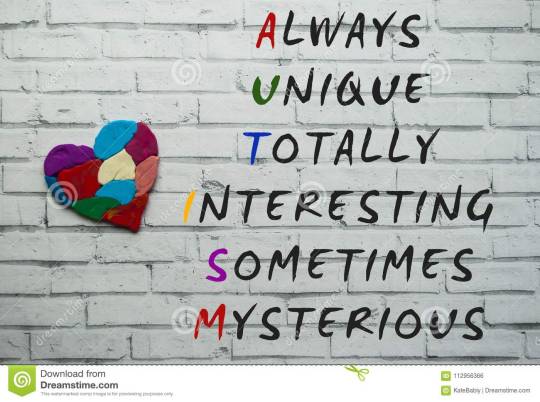
View On WordPress
2 notes
·
View notes
Text
Just discovered a hatred towards kinetic sand, will love exploring it in a way that makes me gag and want to throw up, because the kid liked playing with it but doesn't want to touch it 😀 so I have to touch it 😀
#neurodivergent#asd#signs of autism#autism spectrum disorder#sensory issues#sensory icks#this kid will be the death of me i swear#work stuff#kinetic sand
1 note
·
View note
Text
Over the last decade or two, research efforts and awareness have greatly facilitated autism detection in infants and young children, both by the parents and developmental pediatricians, with relative ease. Chances are, there are likely to be many more adults with autism these days who escaped diagnosis during childhood. Investigations into adult autism have revealed that the symptoms are often milder than those seen in children and tend to present differently in men and women.
0 notes
Text
neurotypicals are so funny sometimes. “well, just don’t forget it next time.” holy shit. you’ve done it. you’ve fixed me. who knew memory problems could be solved so simply? i am no longer autistic, i am ready to join you at the social function. by god.
#/sar#raii talks a lot#i think it’s a combination of the autism and the adhd but an irl said “i am no longer autistic” yesterday when she got through small talk#and i haven’t stopped thinking about it. anyway if i’d known i could “just remember” i wouldn’t have signed up for this oh wow /j#attacking my math professor is always morally correct. it is always the right thing to do
56K notes
·
View notes
Text
#autism spectrum disorder#brain#neuroscience#asd#autism#autism research#neurodiversity#adhd#pbs#nurse#psychologist#assessment#scicomm#adult autism#difference between adhd and autism#adhd and autism#signs of autism#autism vs adhd#autism or adhd#do i have adhd#autism and adhd together#kennedy krieger institute#children#pediatric care#brain disorders#disability#special needs#developmental#early signs of autism#dr. rebecca landa
0 notes
Text
youtube
Ask Dr. Doreen | Should you rely on "Trial Sets per Hour?"
Dr. Doreen Granpeesheh BCBA-D responds to a viewer that wanted to know, what the average number of Trial sets per hour should be for their kid? Doreen however, has her own opinions on the topic of "trial sets per hour." Tune in and see what Dr. Doreen has to say in this segment of Ask Dr. Doreen. Thank you for watching this video: "Ask Dr. Doreen | Should you rely on 'Trial Sets per Hour?'".
#autism live#autism spectrum#autism spectrum disorder#autism support#autism parents#applied behavior analysis#autism parent to parent#autistic children#autistic kids#kids on the autism spectrum#parents of autistic children#aba therapy#behavioral therapy#asd kid#behavior analyst#trial sets per hour#average trial sets per hour#trial sets#aba trials#signs of autism#should you rely on "trial sets per hour#Youtube
0 notes
Text
Easily Overlooked Autistic Traits
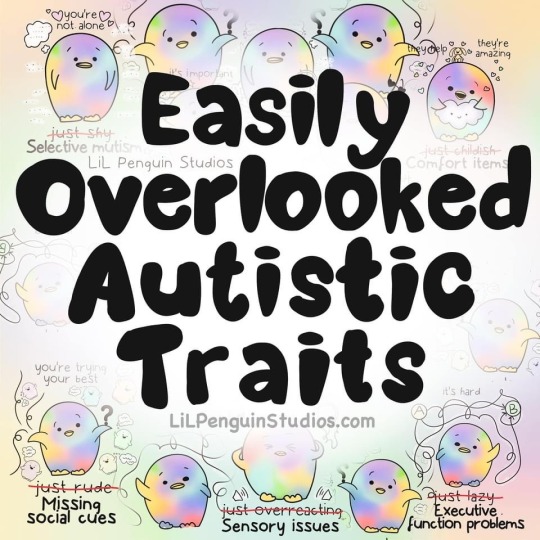
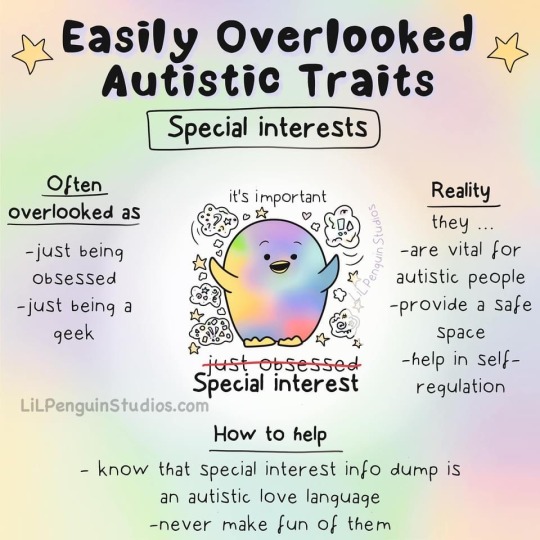
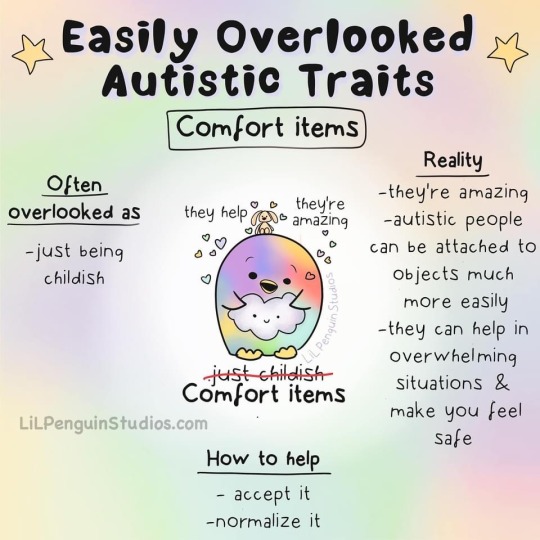
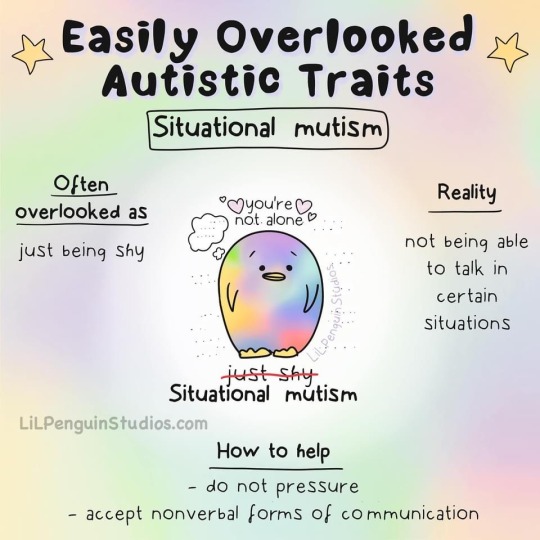
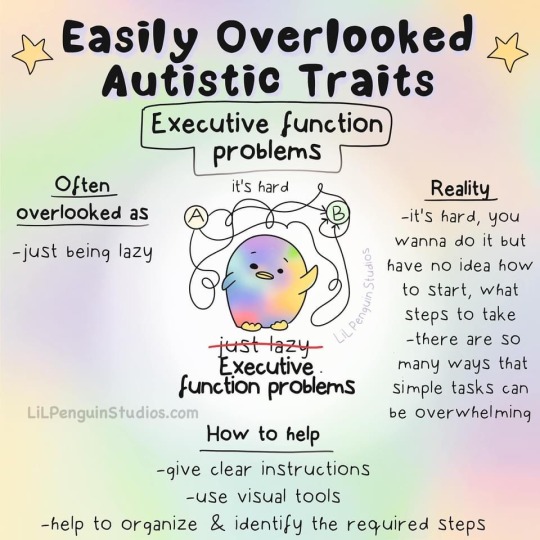
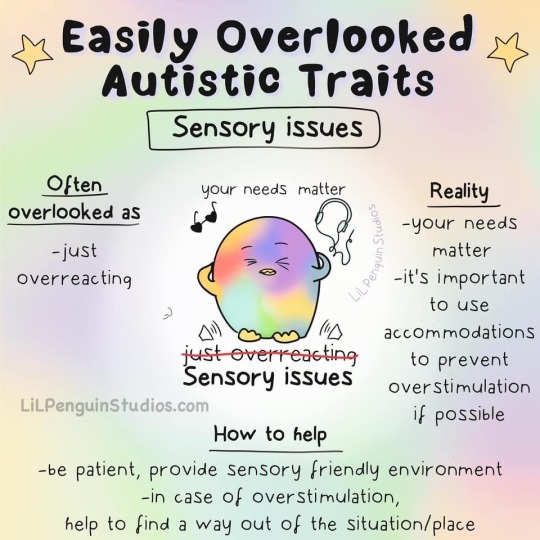
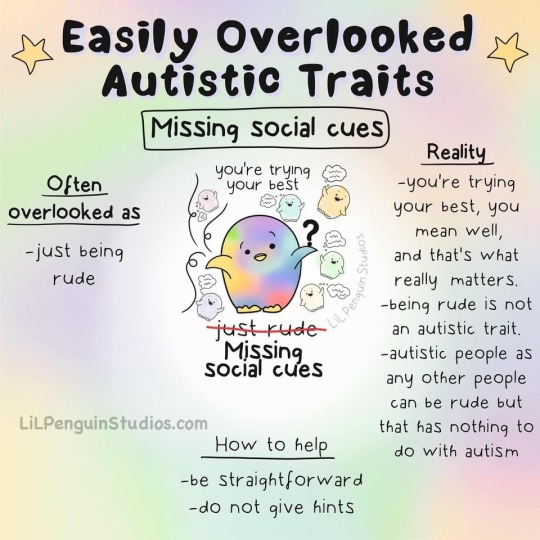
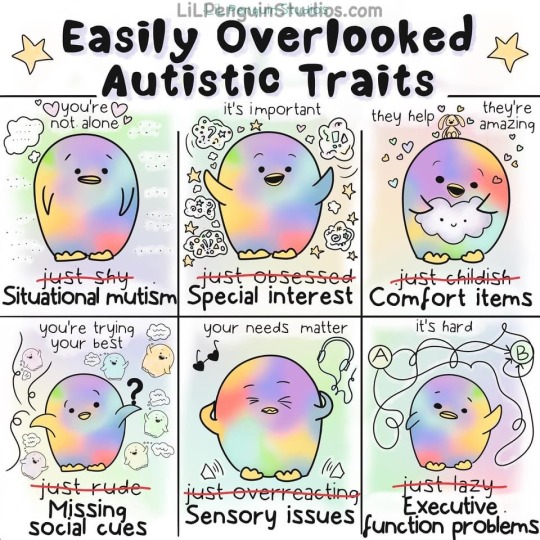
Lil Penguin Studios/Autism Happy Place
#autism#actually autistic#overlooked traits#signs of autism#neurodivergence#neurodiversity#actually neurodivergent#feel free to share/reblog#Lil Penguin Studios/Autism Happy Place (Facebook)
745 notes
·
View notes
Text
Audhd culture is being okay with being on hold for half an hour because the repetitive music and "We are experiencing unexpectedly high call volumes" doesn't bother you and is actually kind of soothing, but you can't sit and eat for family dinner
#both from adhd rambunctiousness#and autistic inability to sit in a chair and/or hear people chew#adhd#undiagnosed autistic#autism memes#actually autism#just autism things#signs of autism#autist#living with adhd#adhder#audhd#autistic and adhd#adhd memes#neurospicy#neurodiverse#neurodivergent#also I've been on hold for twenty minutes#and I don't know why I'm not really bothered lmao
475 notes
·
View notes
Text

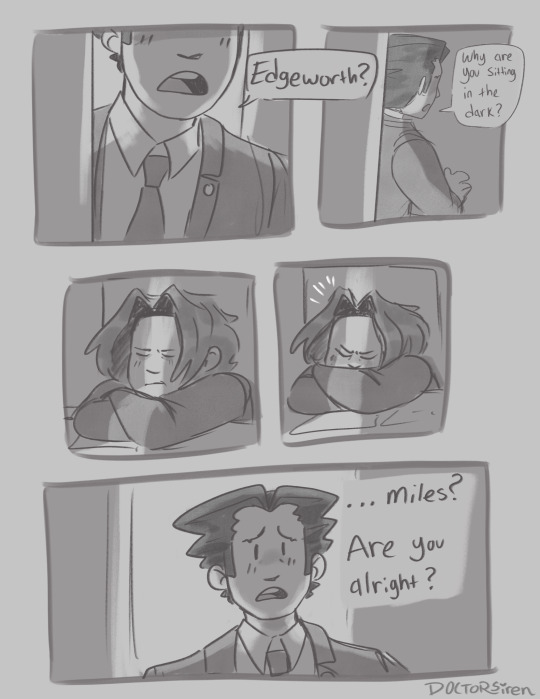

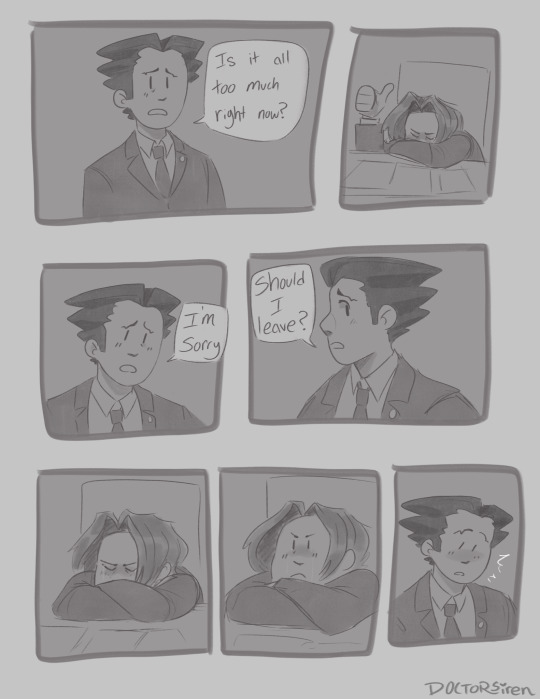


GRAHHH THEY TRUST AND UNDERSTAND EACH OTHER 💥💥💥
#doctorsiren#ace attorney#miles edgeworth#phoenix wright#narumitsu#wrightworth#ace attorney fanart#fan comic#miles edgeworth has autism and I will not take criticisms on that#he would definitely know sign language for both his own benefit and to aid him in his work#I’ve said this before but then Phoenix would notice him using it sometimes and secretly learn it#art#digital art#my art#fanart#procreate
2K notes
·
View notes
Text
Mask Off, Nerd Out:
*all of the brothers have just finished a family dinner with MC. The food was nice, but their human has been oddly quiet throughout the whole meal. As the finished plates are getting stacked up, they shoot each other worried glances*
Mammon: *whispers to Satan* Hey, have they being actin' kinda weird to you...?
Satan: *whispers back* So you've noticed...?
Asmo: *comes up behind Satan and joins* Did anyone upset them today? Like you, Mammon?
Mammon: Hey, it wasn't me...!
*while those three keep whispering, Beel comes over to collect MC's plate. They've been sp checked out that they've barely touched their food at all, they just keep bouncing their leg under the table*
Beel: MC? ... Are you going to finish that?
*his question makes MC snap awake briefly, turning to look at him like a deer in headlights before shaking their head*
MC: N-no! No, uh... I'm fine. Go ahead, Beel.
*they push the plate towards him before going back to staring at the table blankly. Beel eats their forgotten meal, but frowns at them between bites*
Beel: Really-mmphhg-? Are you-*gulp*-sure?
MC: *bounces their leg more rapidly, nodding* Yep. Yep. Totally fine!....
*Mammon finally steps away from Satan and Asmo and nudges Beel to the side*
Mammon: Are ya really sure? 'Cause you don't look fine...
MC: *continues to stare at the table like they're mentally screaming inside, at this point nearly vibrating at an atomic level*
MC: Yep, uhm-hm, all fine, totally good!
*Mammon's about to pull their chair back from the table, but Levi suddenly jumps in between them. For once, the timid otaku looks actually confident about something. Damn near certain in fact!*
Levi: Don't worry, I got this. Leave it to me!
Levi: *takes a seat next to MC*
Levi: MC. Is there something you're hoping to talk about right now?
*MC nearly breaks their neck with how quick they turn to face him, eyes locked on and body finally going still. Slowly... an ecstatic grin starts to brighten their face*
MC: Ohmygod,soIjuststartedthismanga,right,aboutaworldwerepeoplesometimesturnintothesemonsterscalledChoujinandthemaincharacterislike-
*MC keeps talking a mile a minute while Levi nods along happily and the other brothers look at them like they're aliens, but also seem visibly relieved...*
Mammon: Ah. They just had to nerd out, I guess...
#self indulgent post#cause i just got diagnosed for autism#i guess there were signs lol#obey me#obey me shall we date#shall-we-date-obey-me#obey me leviathan#obey me satan#obey me mammon#obey me asmo#obey me beel#obey me incorrect quotes
1K notes
·
View notes
Text
Autism Spectrum Disorders - What Are the Main Symptoms of Autism?
Autism is a neurological condition that affects how people see, hear and feel the world. It is a spectrum disorder and can be diagnosed by doctors in different ways, depending on which symptoms are present.
How does autism develop?
A child with autism usually has a very difficult time learning to communicate with others. This is known as social communication disorder (SCD). Their language skills can be very delayed and they may not be able to read facial expressions or tone of voice. They often have problems with interpreting other people’s body language and they may make unusual movements such as shaking their arms (commonly called stimming).
It can also affect their motor skills. They may move very slowly or in a very clumsy way. They can also have poor attention and concentration.
They may also have a very limited imagination and enjoy things that are not real. They can also have repetitive behaviors and extreme interests in specific topics like sports teams or science.
How can my child be screened for autism?
A doctor or other specialist will look at your child’s behavior and developmental milestones. They might use a simple questionnaire, or they may perform a more in-depth evaluation.
When you have a child with autism, the most important thing is that they get early, effective treatment. It can make a big difference in their lives.
What are the different types of autism?
Autism is a complex brain disorder that can be hard to diagnose. It can have different effects on a person, ranging from mild to severe. The main symptoms of autism are trouble with social communication and interaction and restricted or repetitive behaviors or interests.
Some people with ASD can learn new skills and improve over time. This can help them gain more independence.
They can also get better at using gestures or pictures to communicate. They may have trouble with certain sensory sensitivities and problems regulating their emotions, such as anxiety.
Other symptoms of autism can include a lack of empathy or feeling overwhelmed by other people’s emotions, as well as issues with impulse control and obsessive-compulsive disorder.
In some cases, children with autism can have a learning disability or ADHD (attention deficit hyperactivity disorder) as well. These conditions can make it harder to be successful in school and at work.
What should I say when talking to someone with autism?
The correct way to talk to a person with autism is not to use the words “autistic” or “on the spectrum.” It is better to refer to the individual as someone who has a developmental disorder or an intellectual disability.
If you are unsure about what to say, the best thing is to ask the person with autism for advice. They will know more about what it is like to live with autism and will be able to give you the right advice.
Some people have been able to change their behavior and learn to function in a more normal way by taking special education courses or other forms of treatment. This might include occupational therapy, behavioral therapy or speech and autism therapy.
#autism#autism symptoms#autism spectrum#signs of autism#symptoms of autism#autism in adults#adult autism#adult autism symptoms#is autism hereditary#autism therapy#autism levels#signs of autism in women#adult autism diagnosis#autism traits
9 notes
·
View notes